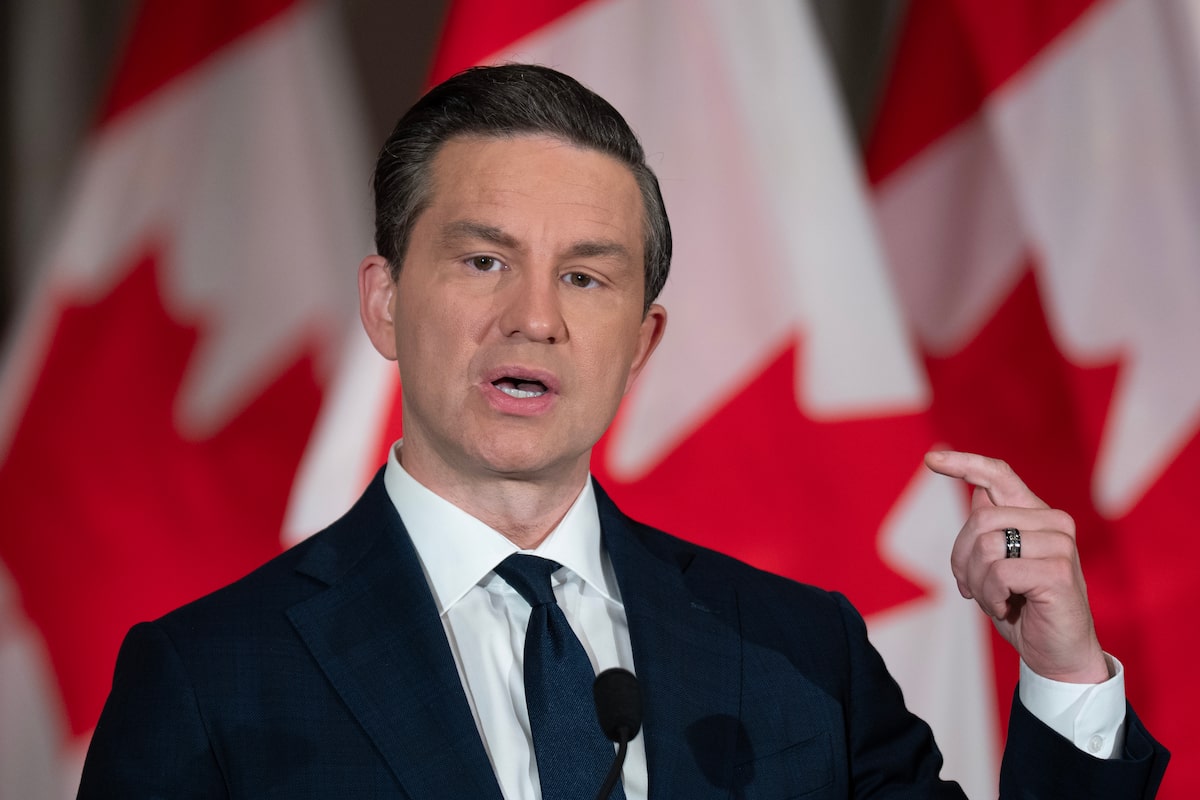Conservative Leader Pierre Poilievre said Wednesday that Canada should respond to Beijing’s latest canola tariffs by cancelling a $1-billion federal loan to BC Ferries for the purchase of Chinese-made vessels.Adrian Wyld/The Canadian Press
Conservative Leader Pierre Poilievre accused Prime Minister Mark Carney’s of weak leadership for not speaking up in support of canola farmers after the Chinese government imposed more tariffs on the sector.
Mr. Poilievre said Thursday Canada must look at ways it can penalize the Chinese government, reiterating his call for the government to cancel a $1-billion federal loan to BC Ferries for the purchase of Chinese-made vessels.
The Prime Minister must also speak out on the issue, Mr. Poilievre said.
“I had my team check his Twitter account. He hasn’t tweeted a single thing about canola. Yet, he’s been able to tweet about International Cat Day. So isn’t that nice?” Mr. Poilievre told reporters in Saskatchewan.
“We need a Prime Minister who will actually stand up for all Canadians, including and especially our prairie producers.”
Canola industry asks Ottawa to curtail vegetable-oil imports after China imposes new trade barriers
On Tuesday, Beijing announced 75.8-per-cent duties on Canadian canola seed, which followed the imposition of 100-per-cent tariffs on canola oil and meal in March.
The move means all Canadian canola products are effectively barred from China.
Mr. Poilievre accused the Liberal government of not caring about the West, and called for canola producers to be supported in the same way as industries facing U.S. tariffs.
The tariffs on canola have been linked to the Liberal government’s decision last year to impose a tariff on Chinese-made electric vehicles and 25-per-cent tariffs on Chinese steel and aluminum.
Mr. Poilievre did not directly answer a question about whether the EV tariffs should be removed, but said Canada should use the revenue from the trade dispute to support affected Canadian sectors.
“And that, of course, is mostly our canola producers,” he said.
You can’t fly sovereignty on foreign fuel
“So, it’s time for the federal government to start treating the Prairies and Western Canada with the respect people here deserve. It’s time for a strong voice to stand up for the West.”
Mr. Poilievre lost his seat in the April general election and is now running in the Alberta riding of Battle River-Crowfoot. The vote in that by-election is set for Monday.
He was asked Thursday whether he can remain as leader of the party if his share of the vote in that election falls short of the nearly 83 per cent that the Conservative candidate, Damien Kurek, won in the April election.
He did not directly answer the question.
Mr. Poilievre also faces a leadership review at the party’s national convention in January.
Alberta by-election where Poilievre is running highlights need for electoral reform, protesters say
In imposing the canola tariffs, China’s Ministry of Commerce has argued that Canada’s canola sector has benefited from extensive government subsidies and preferential policies that distort markets, and that they launched their own anti-dumping probe.
The federal ministers of trade and agriculture said Canada was “deeply disappointed” with the Chinese decision.
“We do not dump canola. Our hard-working farmers provide world-class food to Canadians and international trading partners,” Maninder Sidhu, Minister of International Trade, and the Honourable Heath MacDonald, Minister of Agriculture and Agri-Food said in a statement Tuesday.
“Canada is committed to ensuring fair market access for our canola industry, and we remain ready to engage in constructive dialogue with Chinese officials to address our respective trade concerns.”
The industry wants Ottawa to limit imports of used vegetable oils to shore up domestic demand.
With a report from Kate Helmore and Bill Curry.

